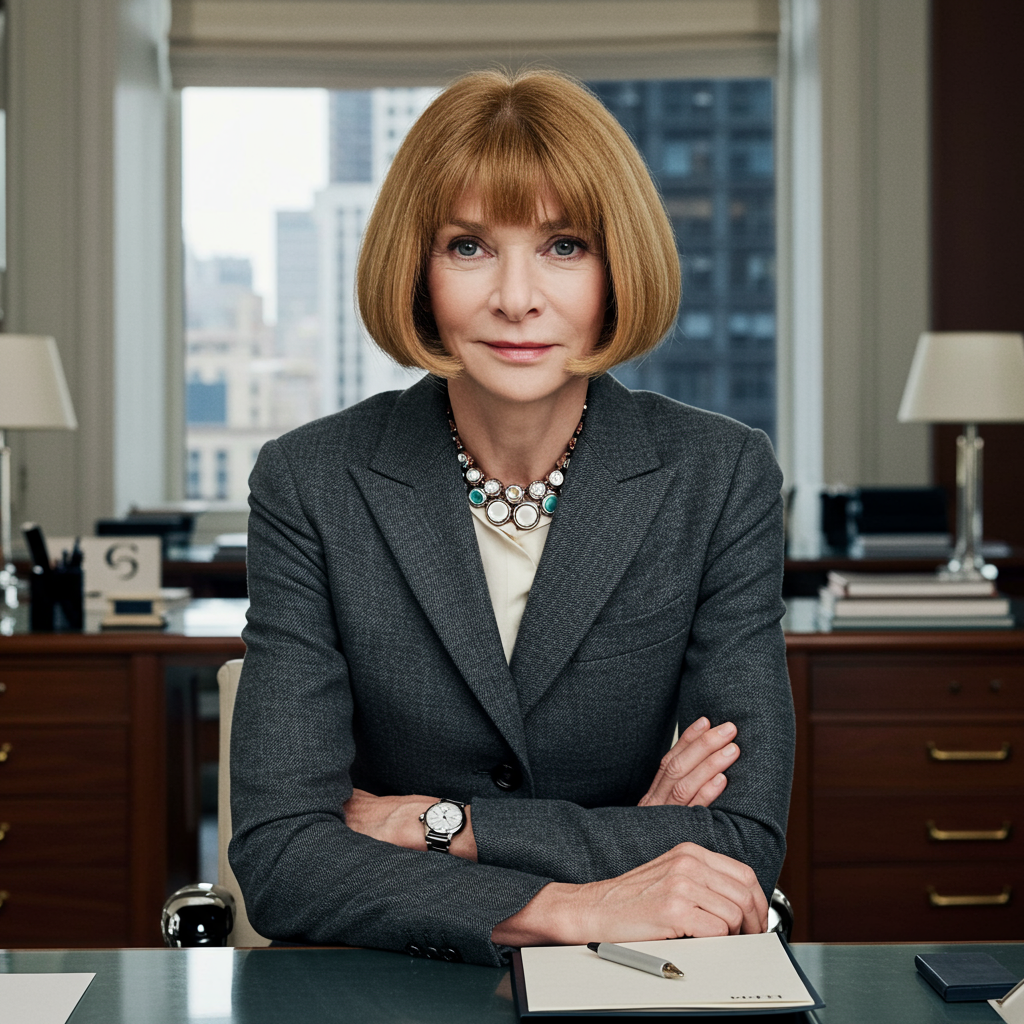The fashion world is marking the end of a monumental era. Anna Wintour is stepping down from her position as Editor-in-Chief of American Vogue, a role she has held for an unprecedented 36 years. The announcement, reportedly made to staff on June 25, 2025, signals a significant transition, though Wintour, 75, is not retiring entirely from her formidable influence within the media giant Condé Nast.
For over three decades, Wintour didn’t just edit American Vogue; she became it, earning the unofficial, widely acknowledged title of “queen of fashion.” Her signature glossy bob and ever-present sunglasses were fixtures on the front row of every major show, a presence so iconic she was often referred to simply as “Anna,” akin to cultural titans like Beyonce and Madonna.
Amplifying Fashion’s Cultural Empire
Wintour’s impact extended far beyond curating magazine pages. She profoundly amplified fashion’s place in global culture, transforming it into the ambitious, powerful industry seen today. From groundbreaking moves like Louis Vuitton appointing Grammy-winning musician Pharrell Williams as creative director to fashion exhibitions becoming major fixtures on the arts calendar, the industry owes a vast debt to Wintour’s visionary leadership.
Recognizing the potent “soft power” a Vogue cover could confer, Wintour pioneered featuring actors, pop stars, and even politicians – a radical departure from the model-only tradition. This strategic move leveraged Vogue’s gatekeeper status across Washington, Hollywood, and global fashion weeks, making the magazine a cultural barometer far beyond its pages. Under her guidance, Vogue helped launch the careers of designers like John Galliano, Marc Jacobs, and Alexander McQueen, and transformed the release of major issues, particularly the September edition, into significant cultural events.
Beyond the ‘Devil Wears Prada’ Persona
While the character of Miranda Priestly in “The Devil Wears Prada” novel and film (based on a former assistant’s experience) solidified an image of an imperious, intimidating boss, the reality of Wintour’s influence is more complex. She is indeed known for swift decisions and a no-nonsense approach, likened by some to a military commander. Her public persona hovers around cool courtesy, dipping to frosty lows for unpunctuality or incompetence.
However, this carefully crafted image contrasts with a private life devoted to family, a deep passion for the arts, and her well-known status as a dedicated tennis superfan (even occasionally skipping Fashion Week for the US Open). Wintour herself has called her sunglasses a “prop” that helps her “be seen and not be seen.” The 2009 documentary “The September Issue” offered a counter-narrative, portraying a driven professional who built an empire through hard work and attention to detail.
A Legacy of Innovation and Influence
Wintour’s foresight was evident from her first American Vogue cover in 1988. Featuring model Michaela Bercu in faded denim jeans paired with a haute couture Christian Lacroix jacket, it was considered controversial and signaled a revolutionary blend of high-low fashion and the coming era of post-dress-code informality.
Beyond the magazine, Wintour’s stewardship transformed the Met Gala into one of the world’s most prestigious annual fashion and celebrity events, a testament to her ability to merge high culture, philanthropy, and star power. Her gravitas was such that rumors of her being considered for US Ambassador to London circulated widely, fueled by her heavyweight fundraising for political figures.
The Next Chapter: Global Leadership
Importantly, Wintour’s step down as American Vogue’s Editor-in-Chief does not mean retirement. She will retain significant, powerful roles within Condé Nast, continuing as the company’s Global Chief Content Officer and the Global Editorial Director of Vogue. In these capacities, she will oversee all international editions of Vogue (over 25) and provide strategic direction for numerous other Condé Nast publications worldwide, including Vanity Fair, GQ, and Architectural Digest.
This shift is part of a broader structural reorganization at Condé Nast, centralizing editorial leadership globally and often replacing traditional EIC roles with “heads of editorial content.” Wintour’s move formalizes her expanded global remit. She has indicated her commitment to continuing her work, stating she has “so much more to achieve.”
Throughout her tenure, Wintour successfully navigated major industry shifts, from the rise of digital media to increasing demands for diversity and inclusion, maintaining Vogue’s relevance and steady circulation amidst challenges like declining sales and the emergence of AI.
Her immense contributions have been recognized with significant accolades, including being appointed a Dame Commander of the British Empire by Queen Elizabeth II in 2017, a Companion of Honour by King Charles III, and she is slated to receive the Presidential Medal of Freedom from President Joe Biden in 2025.
While the American Vogue editorship chapter closes at the end of 2024, Anna Wintour’s influence will undoubtedly continue to shape the fashion and media landscape from her elevated global position at Condé Nast.

